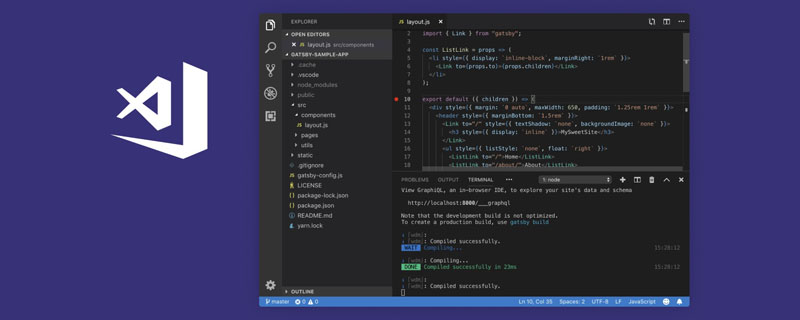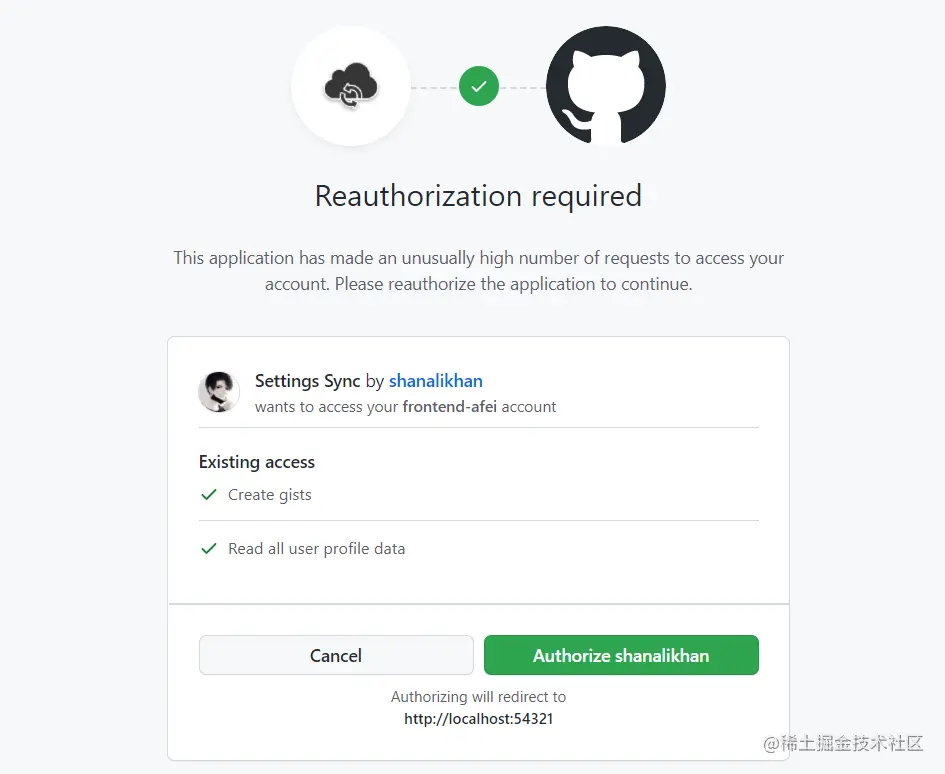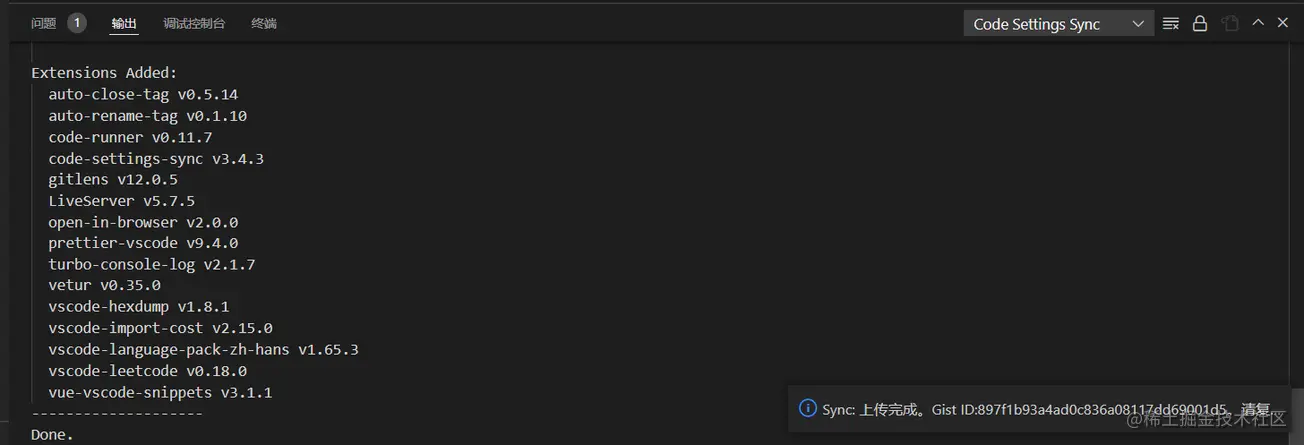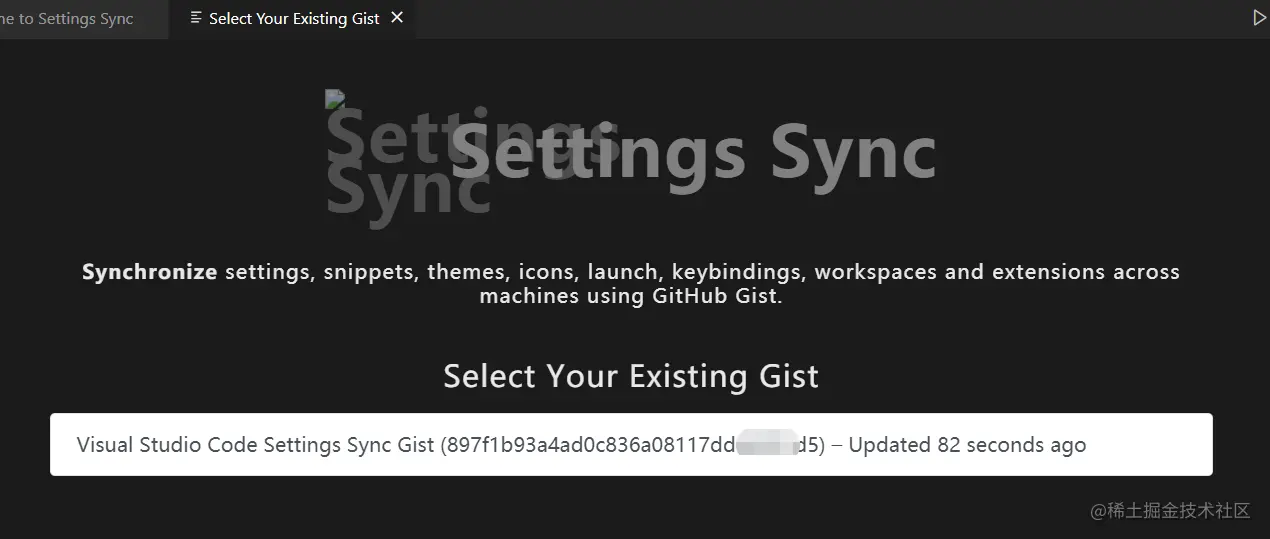 Development Tools
Development Tools
 VSCode
VSCode
 Share the VSCode synchronization configuration method to allow you to migrate your computer environment gracefully!
Share the VSCode synchronization configuration method to allow you to migrate your computer environment gracefully!
Share the VSCode synchronization configuration method to allow you to migrate your computer environment gracefully!
This article will take you through the VSCode synchronization configuration method, so that you can elegantly migrate the computer environment and take away the VSCode configuration from your previous job. I hope it will be helpful to everyone!

If a worker wants to do his job well, he must first sharpen his tools. It’s the annual job-hopping competition again. I wonder if everyone is getting restless! If you have found a suitable niche and are ready to quickly integrate into the new company, then synchronizing the VSCode plug-in and configuration may be of great help to you. Without further ado, let’s get started!
1. Install the plug-in
Search for Settings Sync in the plug-in store and install it.

[Recommended study: "vscode introductory tutorial"]
2. Log in
There are two ways to log in. I usually choose Github to log in and click LOGIN WITH GITHUB.

The default browser will automatically open at this time, and we click Authorize shanalikhan to authorize.

3. Upload configuration information
After successful authorization, use shif ctrl p Open the naming panel, enter Sync, and select Update/Upload Configuration.

At this time, a Gist message will be automatically created and uploaded to Github. After the upload is successful, the console will output a prompt message:

4. Check the Gists information
in Log in to Github in the browser, open the drop-down menu, and select Your gists.

You can see that the Gist you just created has appeared. Click to see the complete configuration information.

5. Download configuration
The question arises at this time, how to use the computer in the new company Where is the configuration information downloaded from Gist? The method is also very simple. First log in according to the above method. After successful login, the following interface will appear:

Shown here are all Gist in Github , one Gist corresponds to one configuration information, choose the one you want to use. At this time, Gist ID will be automatically configured into your VSCode.
Then open the naming panel again, enter Sync, and select Download Configuration.
#The console also outputs the corresponding prompt information. At this time, all plug-ins and configurations have been synchronized! Isn’t it so easy!
6. Summary
In fact, VSCode has its own synchronization function, which is in the settings in the lower left corner. But I don’t think it’s easy to use, and I don’t know where the configuration information exists. Interested friends can try it themselves.
Note: If Your gists cannot be opened in Github, then you may need some scientific methods to access the Internet.
For more knowledge about VSCode, please visit: vscode tutorial! !
The above is the detailed content of Share the VSCode synchronization configuration method to allow you to migrate your computer environment gracefully!. For more information, please follow other related articles on the PHP Chinese website!

Hot AI Tools

Undresser.AI Undress
AI-powered app for creating realistic nude photos

AI Clothes Remover
Online AI tool for removing clothes from photos.

Undress AI Tool
Undress images for free

Clothoff.io
AI clothes remover

Video Face Swap
Swap faces in any video effortlessly with our completely free AI face swap tool!

Hot Article

Hot Tools

Notepad++7.3.1
Easy-to-use and free code editor

SublimeText3 Chinese version
Chinese version, very easy to use

Zend Studio 13.0.1
Powerful PHP integrated development environment

Dreamweaver CS6
Visual web development tools

SublimeText3 Mac version
God-level code editing software (SublimeText3)

Hot Topics
 How to define header files for vscode
Apr 15, 2025 pm 09:09 PM
How to define header files for vscode
Apr 15, 2025 pm 09:09 PM
How to define header files using Visual Studio Code? Create a header file and declare symbols in the header file using the .h or .hpp suffix name (such as classes, functions, variables) Compile the program using the #include directive to include the header file in the source file. The header file will be included and the declared symbols are available.
 What computer configuration is required for vscode
Apr 15, 2025 pm 09:48 PM
What computer configuration is required for vscode
Apr 15, 2025 pm 09:48 PM
VS Code system requirements: Operating system: Windows 10 and above, macOS 10.12 and above, Linux distribution processor: minimum 1.6 GHz, recommended 2.0 GHz and above memory: minimum 512 MB, recommended 4 GB and above storage space: minimum 250 MB, recommended 1 GB and above other requirements: stable network connection, Xorg/Wayland (Linux)
 vscode terminal usage tutorial
Apr 15, 2025 pm 10:09 PM
vscode terminal usage tutorial
Apr 15, 2025 pm 10:09 PM
vscode built-in terminal is a development tool that allows running commands and scripts within the editor to simplify the development process. How to use vscode terminal: Open the terminal with the shortcut key (Ctrl/Cmd). Enter a command or run the script. Use hotkeys (such as Ctrl L to clear the terminal). Change the working directory (such as the cd command). Advanced features include debug mode, automatic code snippet completion, and interactive command history.
 How to solve the problem of vscode Chinese annotations becoming question marks
Apr 15, 2025 pm 11:36 PM
How to solve the problem of vscode Chinese annotations becoming question marks
Apr 15, 2025 pm 11:36 PM
How to solve the problem that Chinese comments in Visual Studio Code become question marks: Check the file encoding and make sure it is "UTF-8 without BOM". Change the font to a font that supports Chinese characters, such as "Song Style" or "Microsoft Yahei". Reinstall the font. Enable Unicode support. Upgrade VSCode, restart the computer, and recreate the source file.
 Where to write code in vscode
Apr 15, 2025 pm 09:54 PM
Where to write code in vscode
Apr 15, 2025 pm 09:54 PM
Writing code in Visual Studio Code (VSCode) is simple and easy to use. Just install VSCode, create a project, select a language, create a file, write code, save and run it. The advantages of VSCode include cross-platform, free and open source, powerful features, rich extensions, and lightweight and fast.
 Common commands for vscode terminal
Apr 15, 2025 pm 10:06 PM
Common commands for vscode terminal
Apr 15, 2025 pm 10:06 PM
Common commands for VS Code terminals include: Clear the terminal screen (clear), list the current directory file (ls), change the current working directory (cd), print the current working directory path (pwd), create a new directory (mkdir), delete empty directory (rmdir), create a new file (touch) delete a file or directory (rm), copy a file or directory (cp), move or rename a file or directory (mv) display file content (cat) view file content and scroll (less) view file content only scroll down (more) display the first few lines of the file (head)
 vscode terminal command cannot be used
Apr 15, 2025 pm 10:03 PM
vscode terminal command cannot be used
Apr 15, 2025 pm 10:03 PM
Causes and solutions for the VS Code terminal commands not available: The necessary tools are not installed (Windows: WSL; macOS: Xcode command line tools) Path configuration is wrong (add executable files to PATH environment variables) Permission issues (run VS Code as administrator) Firewall or proxy restrictions (check settings, unrestrictions) Terminal settings are incorrect (enable use of external terminals) VS Code installation is corrupt (reinstall or update) Terminal configuration is incompatible (try different terminal types or commands) Specific environment variables are missing (set necessary environment variables)
 vscode Previous Next Shortcut Key
Apr 15, 2025 pm 10:51 PM
vscode Previous Next Shortcut Key
Apr 15, 2025 pm 10:51 PM
VS Code One-step/Next step shortcut key usage: One-step (backward): Windows/Linux: Ctrl ←; macOS: Cmd ←Next step (forward): Windows/Linux: Ctrl →; macOS: Cmd →







